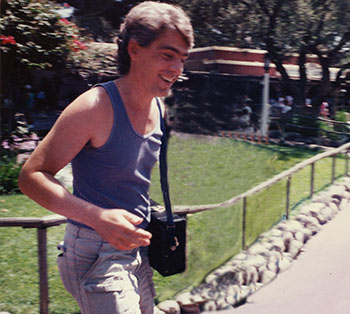Saturday Night
Author: Albert d'Ossché
Date/Studio: 1984 Altman, San Francisco, CA
Engineer: Sandy Stone
Producer: Robert Force
Original Release: When the Moon Fell on California (KM318)
Current Release: The Complete Recordings (BSR 158)
 This tune of Albert's ranks very high as one of my personal favorites. In the many, many times it was performed on stage I would sit down or later, stand off to the side so that when it came to the final chorus I could join in. That is the way it was recorded on the Moon Fell lp. I felt so powerfully about it's completeness that there was nothing I could add musically-- but I still wanted to sing along.
This tune of Albert's ranks very high as one of my personal favorites. In the many, many times it was performed on stage I would sit down or later, stand off to the side so that when it came to the final chorus I could join in. That is the way it was recorded on the Moon Fell lp. I felt so powerfully about it's completeness that there was nothing I could add musically-- but I still wanted to sing along.
Once again Al steps into his sense of suspended time in the way he presents the song. He leaves a lot of room for the tune to breathe, the ideas to grow-- to sink in and gain weight. He rushes some phrases and hangs back tentatively on others, both vocally and with his dulcimer. He reaches for the deeper timbre of his instrument, a vox humana, playing off of the bass course which he double-strung with a treble octave string so he always got both the bass and it's high harmony.
Then he sings the singularly most poignant and complete lyrics in just two verses and a chorus to describe his life, his father's life, our lives together as musicians and his sense of his place in the universe. Nothing could be simpler. Nothing could be more profound. That's why I stood aside when he sang this song. It was a paean, an homage to everything meaningful in his life.
For all of his ability to make others laugh, Albert was a melancholy soul. He was well aware of this. It sounds out of context with the rest of the song's otherwise poetic lyrics to hear him sing, “being happy ain't so bad,” but that's who he was. In this song he comes to peace with the recognition of his father, his hometown, his finding joy in the playing of music with his best friend-- and at the same time keeping a watchful eye on his never-ending search for truth.
Like settling the ghosts of his past as he did with his song, In the Fall, Albert takes it a step further-- or perhaps nearer-- in Saturday Night. In the Fall lays these experiences at the feet of his Beloved. In Saturday Night he at last owns the experiences. “We are not always what we seem and hardly ever what we dream-- just lives that pass in time, leaving traces from behind.”
He sings the song totally in his New Orleans born character self-- not the one that was refined by prep schools. He purposefully uses colloquial dialect, “say” instead of “said”. Likewise, if you listen closely, you can hear him sing, “path thith along” instead of “passed this along”. “A true N'awlins native lisps,” he always maintained, “and underneath all of it is a Brooklyn accent”.
This song was not anomalous to Albert's conscious-of-being-on-the-planet journey. It was his work. Yes, he had fun with a lot of our tunes but at the core for both of us was the use of song as a tool to catch an eye-blink of truth. I have an advantage. In my head (and heart) I have the third installment of his trilogy of perception. I hope one day to dig out old concert tapes and rescue a version.
The chorus goes, “Come together, be together, stay together, love together-- singing this old time, singing this old time, singing this old time song.” That's but one short step away from Saturday Night's “singing my songs makes me glad to be here singing songs for you.” His next step was inviting people into his life to share the songs.
Quintin Stephens did an amazing job of transcribing this tune. He once asked me if I knew it. I said I did but that I had never played it. I still don't. He worked out the arrangement (contained in the PDF files) so he could play it while I sang. That brought me immeasurable joy. Nothing is better than live music. Not that the recording is bad. It isn't. Saturday Night, as sung and played on Moon Fell, is as true to the ability, nature and nuance of Albert d'Ossché's artistry as anything left on the planet.
